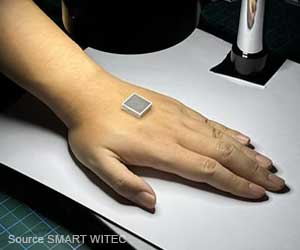For the first time, a tiny device implanted in the brain of epilepsy sufferers helps predict the onset of seizures, report scientists.

The electrodes were connected to a second device implanted under the skin of the chest, which transmitted the data wirelessly to a hand-held device that calculated the probability of a seizure.
The device lights up in red for a high risk, white for moderate, or blue for low seizure probability.
"Knowing when a seizure might happen could dramatically improve the quality of life and independence of people with epilepsy and potentially allow them to avoid dangerous situations such as driving or swimming," lead author Mark Cook from Australia's University of Melbourne said in a statement.
It could also give epilepsy sufferers the freedom to take seizure-stopping drugs before the onset of an attack, rather than on a continuous basis.
Epilepsy is a chronic disorder characterised by recurrent seizures -- anything from a brief lapse of attention or muscle jerks to severe convulsions.
The biggest risk is from falls and injuries sustained when patients lose consciousness.
The researchers said about 30 to 40 percent of patients are unable to keep their seizures under control with existing treatments. The new technology may be especially useful for them.
The team tested the implants on 15 patients and recorded relatively few adverse effects, which included infection and device migration.
The system correctly predicted seizures with a "high warning" sensitivity level greater than 65 percent in 11 of the patients, said a statement.
There was a high variability between seizure warning times, and the team said more work was needed.
"Our small proof-of-concept study shows that seizure prediction is possible and could lead to new therapeutic strategies and more independence for individuals with epilepsy."
Commenting on the study, epilepsy experts Christian Elger and Florian Mormann of the University of Bonn Medical Centre described the outcome as a "major milestone".
But they cautioned it was too early to determine whether the device performed well enough to find medical application.
"This will depend on how well patients tolerate false alarms or missed seizures, and will ultimately need to be decided on an individual basis," they wrote.
"Nevertheless, the presented results suggest that at least some patients would view the warning device as beneficial."
Source-AFP
 MEDINDIA
MEDINDIA




 Email
Email









